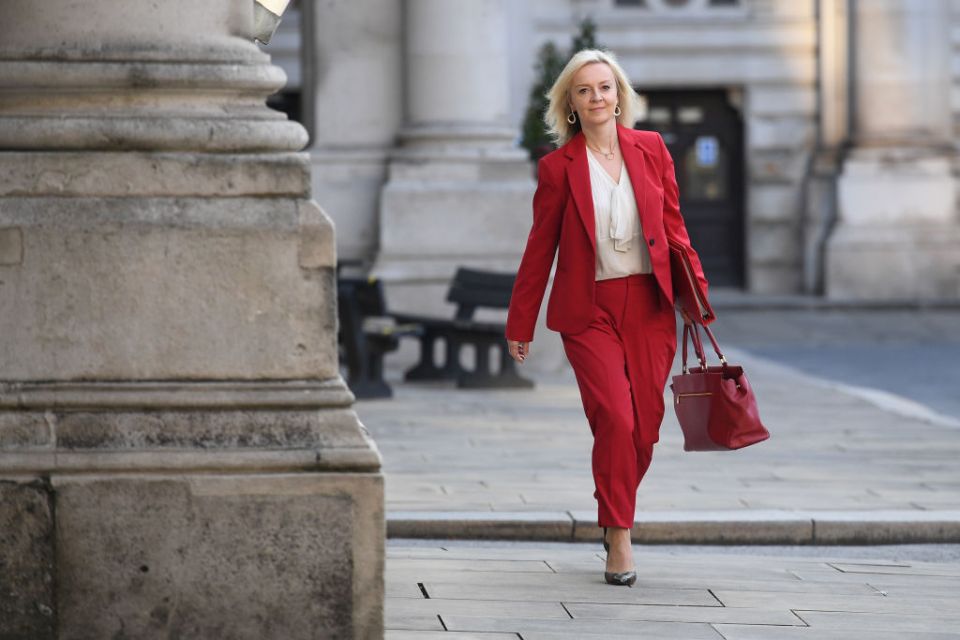Britain must finally decide on the fate of the Northern Ireland Brexit border

Pity Liz Truss. Sharp-suited Chancellor Rishi Sunak fired the starting gun on the Tory leadership race last week with his put down of party-king Boris Johnson. He’s immediately seen as the favourite.
Liz? Well, fresh from a bout of Covid, the Foreign Secretary has the small matter of trying to catch the Chancellor while sorting out the Northern Ireland Protocol.
“Liz having to fix this with a leadership contest around the corner gives poisoned chalices a bad name,” one Westminster observer joked.
The issue for the Foreign Secretary goes beyond the mere – let’s say cut and thrust – of negotiating with the EU against the backdrop of a collapsing Stormont Assembly and the feuding political forces of the DUP and Sinn Fein.
It’s trying to fix something that will shape the entire future of Brexit.
Because that’s what the current row over Northern Ireland represents.
Ever since 2016, the key question with Brexit has been the extent to which Britain chooses to diverge from the EU, its rules and regulations, or remains aligned to them.
And it’s something which still hasn’t been resolved.
The last few weeks have highlighted the problems with this. For all Boris Johnson’s boasts about Getting Brexit Done, the UK has still yet to work out which EU rules to scrap and how to take advantage of independence.
The government’s ‘Benefits of Brexit’ tome last week was almost embarrassing, including key wins such as putting crown stamps on pint glasses and allowing people to get married on cruises.
And the bigger issue is that because of the ‘Protocol’, Westminster can’t scrap EU rules even if it wants to without leaving Northern Ireland behind.
A short history lesson. Boris’ Brexit Deal meant England, Wales and Scotland left the EU, but Northern Ireland remained subject to EU customs code, single market rules and EU VAT legislation (including on gas bills).
The PM’s team decided this split – enshrined in the ‘Protocol’ – was the best way to avoid a hard border between Northern Ireland and the Republic. Trouble was it created a thumping great virtual border down the Irish Sea instead.
At the time the PM boasted of an “excellent” agreement with the EU.
The deal has certainly been OK for Northern Irish businesses – which have suddenly found they are part of the UK internal market AND the EU one. (exports from the North to the Republic soared 64 per cent in the first 11 months of 2021).
But Unionists feel utterly betrayed.
The issue for the Conservative Party is that for all the talk of ‘Britannia Unchained’, Northern Ireland is chained to the EU and will remain so unless Liz Truss can find a solution which avoids customs posts on the border with the Republic.
Boris can insist all he wants that Britain is free to chart its own course now – but he can’t do that without weakening the Union. So what does Liz Truss do? She has a choice but each risks upsetting various Tory factions.
Brexit hardliners want her to mirror the DUP’s demands, rip up the Protocol and bin all checks on goods heading to Belfast from Britain. They want a ‘trusted traders’ type system based around mutual enforcement where each side is responsible for checks on goods entering their territory.
Such a proposal could escalate into a bitter tariff dispute with the EU – who with Boris Johnson severely weakened and a general election around the corner are unlikely to buckle.
The other option? A deal with the EU which would almost certainly mean a concession.
Business groups desperate for stability have been suggesting a way through the mess is for the UK to align with the EU on agri-food rules. They argue that it would remove a huge amount of the paperwork currently involved in sending goods to Northern Ireland.
Expect business to – cautiously – up the ante on this in the coming weeks, suggesting such a move would build goodwill with Brussels and unlock agreements elsewhere in areas such as the EU respecting UK professional qualifications.
Aligning on agri-food would hamper the chances of a US trade deal because Britain wouldn’t be able to import hormone-treated beef. But it’s doubtful UK consumers want it – let alone UK farmers.
Just as Northern Ireland dominated the final days of Theresa May’s reign, it threatens to dominate the final days of Boris Johnson’s tenure too.
And what happens next is pivotal to an administration that swept to power on a Brexit deal that in fact merely kicked the biggest can of all down the road.